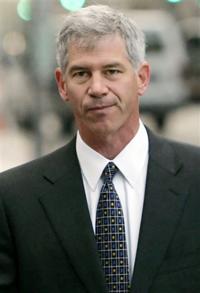SEC Rule 10b-5 and Enron

SEC Rule 10b-5
Let me paint a picture for you. You are the CEO and CFO of a major Fortune 500 corporation. You know that one of the things that has made you a darling on wall street is perception. You know that you have had a tremendous amount of success due to the deregulation of parts of the electricity and gas markets and have invented a genius trading platform. You also know that due to market conditions and "behavioral finance" the public markets have become increasingly innefficient.
You know that your company actually may turn around and be successful, assuming that it is allowed to work off its losses slowly and over time. You need to restate earnings and unwind partnerships as profits from other businesses come in. You know you need a restructuring plan.
However, in order for you to succeed, your restructuring to succeed, and your company to turn around, you need to maintain a decent stock price since your special purpose entities are reliant on an elevated price. You can maybe hold off the investors in the special purpose entities while you kill expenditures on broadband and weather trading, power plants in India, and focus on your core energy trading platform, while reigning in the traders.
Do you go to your employee meeting and tell everyone that your company is in the toilet and they should dump their stock? No.
Do you sell your personal shares and positions in the company? No.
What happened at Enron at the time of the implosion was akin to a run on the bank. Anyone who doesn't see that is incorrectly assessing the situation. However, Skilling and other top brass, where the first in line at the bank. That is wrong. But pumping the company in a bad time, well, they had no choice. The only problem is not putting their money where their mouth was.
But Fastow's partnerships, and conflicts of interests, and all these things...he just postponed the crash with brilliant finance. If only they could turn the business around to be profitable, Enron would be an example of brilliant finance rather than an example of an sinking ship that Skilling got off of and then told everyone that the ship would right its course.
I'm not saying there was no wrongdoing here on the part of Skilling and Lay and many of the top brass, or that Fastow may have crossed some lines. However, the ridiculousness of the whole situation is that Enron is the poster child for 90s excess, comparatively speaking, the things Enron did, was doing, and failed because of was no different than other companies being lauded now.
This is typical of public opinion reacting to stock market losses and look for someone else but themselves to blame. My favorite is when they interview some pipeline operator who said he had a million dollars worth of Enron stock that imploded. A million dollar portfolio? All in Enron? Well he wasn't complaining when his portfolio got to a million and his friends at Dynegy or General Motors where telling him to diversify...
Cisco Systems has a policy of writing off router inventory from a quarter or two ago as obsolete, then storing that inventory in a separate location at a value of $0.00, when someone comes along and buys an old router from them, oh I dunno, a quarter or two later in the year, THEY BOOK THE ENTIRE SALE AS PROFIT!! But that's not fraud....Enron, those bastards were taking the pensions of little old ladies, clubbing baby seals, and beating up hungry orphans.... give me a break...
It's like my brilliant finance professor said when this thing first went down...in a good market its called financial engineering in a bad market its called fraud.
